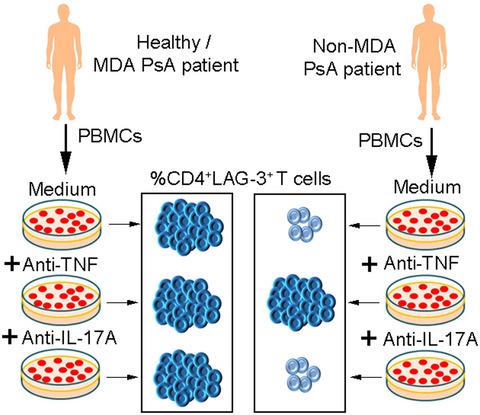当前位置:
X-MOL 学术
›
Clin. Exp. Immunol.
›
论文详情
Our official English website, www.x-mol.net, welcomes your feedback! (Note: you will need to create a separate account there.)
CD4+LAG-3+ T cells are decreased in active psoriatic arthritis patients and their restoration in vitro is mediated by TNF inhibitors
Clinical & Experimental Immunology ( IF 4.6 ) Pub Date : 2021-07-26 , DOI: 10.1111/cei.13646 Smadar Gertel 1, 2 , Ari Polachek 1, 2 , Victoria Furer 1, 2 , David Levartovsky 1, 2 , Ori Elkayam 1, 2
Clinical & Experimental Immunology ( IF 4.6 ) Pub Date : 2021-07-26 , DOI: 10.1111/cei.13646 Smadar Gertel 1, 2 , Ari Polachek 1, 2 , Victoria Furer 1, 2 , David Levartovsky 1, 2 , Ori Elkayam 1, 2
Affiliation

|
Psoriatic arthritis (PsA) is a chronic inflammatory disease associated with T cell dysregulation. The lymphocyte-activation gene (LAG)-3 is one of the regulatory receptors expressed on T cells in a soluble form. LAG-3 expression on T cells was analyzed in vitro in PsA patients with minimal disease activity (MDA), active disease (non-MDA) and healthy controls. In cultured in-vitro peripheral blood mononuclear cells (PBMCs), LAG-3 expression on CD4+ T cells was similar in both MDA PsA patients (7.5 ± 0.9) (n = 14) and healthy controls (7.8 ± 0.6) (n = 15), but significantly lower in non-MDA PsA patients (3.1 ± 0.3) (n = 13) (p < 0.0001). An inverse correlation between PsA clinical disease activity and %CD4+LAG-3+ T cells in vitro was observed (composite psoriatic disease activity index r = −0.47, p < 0.02 and psoriatic arthritis disease activity score, r = −0.51, p < 0.008). In-vitro co-culture of CD4+ T cells with anti-tumor necrosis factor (TNF) or anti-interleukin (IL)-17A had no effect on LAG-3+ expression in MDA PsA patients and healthy controls. In non-MDA patients, anti-TNF, but not anti-IL-17A, restored the %CD4+LAG-3+ T cells (7.9 ± 0.9 and 3.2 ± 0.4, respectively) (p < 0.0004). Lower soluble LAG-3 levels were found in sera of naive to biological PsA patients (n = 39) compared to healthy controls (n = 35) (p < 0.03). Impaired LAG-3 on CD4+ T cells may reflect active PsA disease state. Anti-TNFs have potency to up-regulate the CD4+LAG-3+ T cells in vitro.
中文翻译:

活动性银屑病关节炎患者的 CD4+LAG-3+ T 细胞减少,其体外恢复由 TNF 抑制剂介导
银屑病关节炎 (PsA) 是一种与 T 细胞失调相关的慢性炎症性疾病。淋巴细胞激活基因 (LAG)-3 是 T 细胞上以可溶形式表达的调节受体之一。在具有最小疾病活动性(MDA)、活动性疾病(非MDA)和健康对照的 PsA 患者中体外分析 T 细胞上的 LAG-3 表达。在体外培养的外周血单核细胞 (PBMC) 中,MDA PsA 患者 (7.5 ± 0.9) ( n = 14) 和健康对照 (7.8 ± 0.6) ( n = 15),但在非 MDA PsA 患者中显着较低 (3.1 ± 0.3) ( n = 13) ( p < 0.0001)。体外观察到 PsA 临床疾病活动度与 %CD4 + LAG-3 + T 细胞之间呈负相关(复合银屑病疾病活动指数r = -0.47,p < 0.02 和银屑病关节炎疾病活动评分,r = -0.51,p < 0.008)。CD4 + T 细胞与抗肿瘤坏死因子 (TNF) 或抗白细胞介素 (IL)-17A 的体外共培养对MDA PsA 患者和健康对照中的LAG-3 +表达没有影响。在非 MDA 患者中,抗 TNF(而非抗 IL-17A)恢复了 %CD4 + LAG-3 + T 细胞(分别为 7.9 ± 0.9 和 3.2 ± 0.4)(p < 0.0004)。与健康对照 ( n = 35) 相比,首次接触生物性 PsA 患者 ( n = 39) 的血清中可溶性 LAG-3 水平较低 ( p < 0.03)。CD4 + T 细胞上的 LAG-3 受损可能反映活动性 PsA 疾病状态。抗 TNF 能够在体外上调 CD4 + LAG-3 + T 细胞。
更新日期:2021-07-26
中文翻译:

活动性银屑病关节炎患者的 CD4+LAG-3+ T 细胞减少,其体外恢复由 TNF 抑制剂介导
银屑病关节炎 (PsA) 是一种与 T 细胞失调相关的慢性炎症性疾病。淋巴细胞激活基因 (LAG)-3 是 T 细胞上以可溶形式表达的调节受体之一。在具有最小疾病活动性(MDA)、活动性疾病(非MDA)和健康对照的 PsA 患者中体外分析 T 细胞上的 LAG-3 表达。在体外培养的外周血单核细胞 (PBMC) 中,MDA PsA 患者 (7.5 ± 0.9) ( n = 14) 和健康对照 (7.8 ± 0.6) ( n = 15),但在非 MDA PsA 患者中显着较低 (3.1 ± 0.3) ( n = 13) ( p < 0.0001)。体外观察到 PsA 临床疾病活动度与 %CD4 + LAG-3 + T 细胞之间呈负相关(复合银屑病疾病活动指数r = -0.47,p < 0.02 和银屑病关节炎疾病活动评分,r = -0.51,p < 0.008)。CD4 + T 细胞与抗肿瘤坏死因子 (TNF) 或抗白细胞介素 (IL)-17A 的体外共培养对MDA PsA 患者和健康对照中的LAG-3 +表达没有影响。在非 MDA 患者中,抗 TNF(而非抗 IL-17A)恢复了 %CD4 + LAG-3 + T 细胞(分别为 7.9 ± 0.9 和 3.2 ± 0.4)(p < 0.0004)。与健康对照 ( n = 35) 相比,首次接触生物性 PsA 患者 ( n = 39) 的血清中可溶性 LAG-3 水平较低 ( p < 0.03)。CD4 + T 细胞上的 LAG-3 受损可能反映活动性 PsA 疾病状态。抗 TNF 能够在体外上调 CD4 + LAG-3 + T 细胞。



























 京公网安备 11010802027423号
京公网安备 11010802027423号